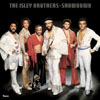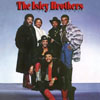 The reappearance of these two unpardonably out-of-print platinum-selling albums recorded in the later years of the R&B group's celebrated 3+3 lineup presents listeners with aural snapshots taken at the twilight of '70s funk and disco. By this time interpersonal tensions in the group and the changing tastes of audiences had begun to affect the sextet, though one could hardly tell given the radioactive funk emitting from these songs.
The reappearance of these two unpardonably out-of-print platinum-selling albums recorded in the later years of the R&B group's celebrated 3+3 lineup presents listeners with aural snapshots taken at the twilight of '70s funk and disco. By this time interpersonal tensions in the group and the changing tastes of audiences had begun to affect the sextet, though one could hardly tell given the radioactive funk emitting from these songs.
By 1978, The Isley Brothers had achieved several prior commercial and critical successes including chart-topping albums like The Heat Is On and Go For Your Guns, as well as the landmark 3+3--the first to feature the unparalleled teaming of singers Ronald, Rudolph, and O'Kelly Isley with musicians Ernie and Marvin Isley and brother-in-law Chris Jasper. Released that year, Showdown could be considered the proverbial "beginning of the end", as the 1980s would prove particularly unkind to the group on multiple fronts, leading to an irresolvable and perhaps inevitable schism between the founders and the younger proteges who updated, revolutionized and ultimately defined its sound. After 1980's Go All The Way, it would take two full decades before The Isley Brothers--finally pared down to Ronald and Ernie, in collaboration with the infamous R. Kelly--would have a platinum album again.
Those performing on Showdown couldn't possibly foresee the difficulties ahead, or at least if they did any such anxiety fails to materialize in the music. As groovy as ever before, Ronald's breathtaking voice leads the band through eight solid tracks, from the sweltering funk of "Rockin' With Fire" to the laidback soul of "Coolin' Me Out". On par with anything George Clinton's Parliament was producing at the time, the fine and funky single "Take Me To The Next Phase" comes across almost as a Sly and The Family Stone homage, purposefully borrowing a lyrical snippet from the latter's classic "Thank You (Falettinme Be Mice Elf Agin)". The title track features Ronald mastering and maintaining his fabulous falsetto while the rock-inflected "Love Fever" gives guitarist Ernie his time to shine, recalling his onetime mentor Jimi Hendrix, who had toured with the band prior to his own massive success. While a good record all around and on its own, in the context of The Isley Brothers' prior discography Showdown passively returns to the well more than the players want to admit, in the vain hope of discovering something different and innovative there. An astoundingly under-appreciated masterpiece, 1980's Go All The Way surpasses the inherent complacency of Showdown and boldly explores a shimmering pop galaxy to the right of its comfort zone. This has much to do with the fact that most of these songs were never originally intended as Isley Brothers material. Rather, as Chris indicates in the booklet, these tunes were written with Ernie and Marvin--growing disgruntled with the business end of things--with the intent of establishing a splinter group featuring those three younger members. (That notion would prove prescient when, in 1984, Isley-Jasper-Isley released the first of three albums.) Indeed, the song had been recorded and were ready for vocals when, at the urging of the two blood brothers, the trio presented it to the singers who decided it was right for a proper Isley Brothers album. Though Chris wrote "Here We Go Again" with his own voice in mind, hearing Ronald sing so exquisitely here I could hardly imagine anyone else doing the song justice.
An astoundingly under-appreciated masterpiece, 1980's Go All The Way surpasses the inherent complacency of Showdown and boldly explores a shimmering pop galaxy to the right of its comfort zone. This has much to do with the fact that most of these songs were never originally intended as Isley Brothers material. Rather, as Chris indicates in the booklet, these tunes were written with Ernie and Marvin--growing disgruntled with the business end of things--with the intent of establishing a splinter group featuring those three younger members. (That notion would prove prescient when, in 1984, Isley-Jasper-Isley released the first of three albums.) Indeed, the song had been recorded and were ready for vocals when, at the urging of the two blood brothers, the trio presented it to the singers who decided it was right for a proper Isley Brothers album. Though Chris wrote "Here We Go Again" with his own voice in mind, hearing Ronald sing so exquisitely here I could hardly imagine anyone else doing the song justice.
Incredibly, discord and the threat of secession by the key songwriting team produced an authentic record both like and unlike its predecessors. The funk hasn't dissipated in the slightest, but there's a glossy sheen that makes everything beautiful. "Say You Will" could have been recorded five years earlier, but not in this elegant fashion. Here, vocal harmonies soar over and alongside Ernie's soloing, with one of Marvin's seismic basslines balancing out Chris' keyboard leads. Both "Pass It On" and closing cut "The Belly Dancer" capitalizes on the final days of disco with a dancefloor-friendly beat and the latter showcasing Ronald's breathy, faux-orgasmic vocal. "Don't Say Goodnight (It's Time For Love" is a rare downtempo cut in the quiet storm tradition, with Chris' delay-drenched synth blips adding an extra bit of dreaminess to the atmosphere fostered by Ronald's seductive tones.
Alongside the requisite liner notes mandatory in any decent reissue, both albums feature full lyrics as well as Chris Jasper's aforementioned commentary in their accompanying booklets. These features add to the excitement of delving into these reissues. Not to discount the work of the rest of the 3+3 lineup, I have to point out that Ronald Isley is a national treasure, and these two records demonstrate his worth. He is perhaps the greatest soul singer alive today, which makes his continued incarceration for a 2006 tax evasion conviction all the more tragic.
samples:
From Showdown:
From Go All The Way:
Read More

